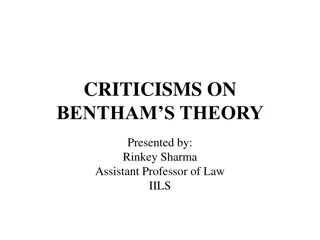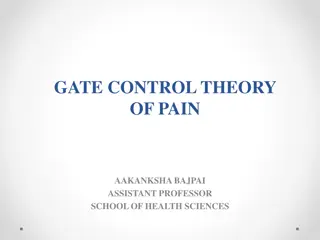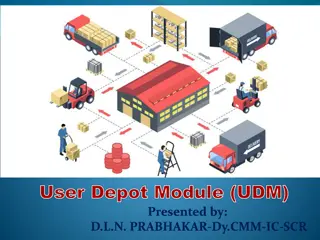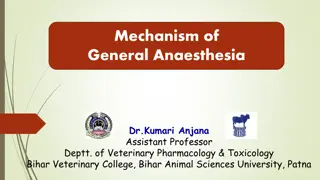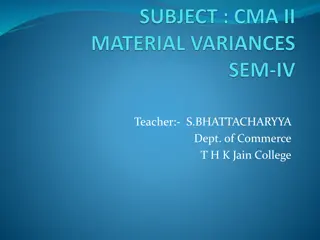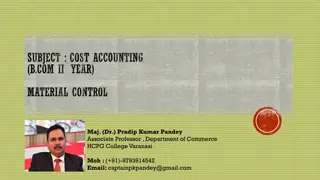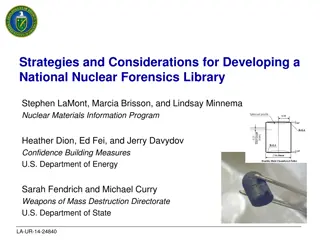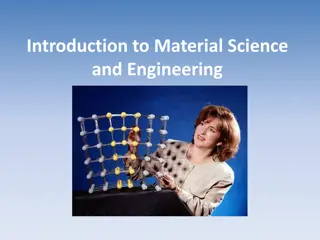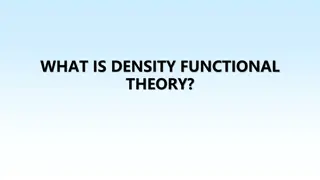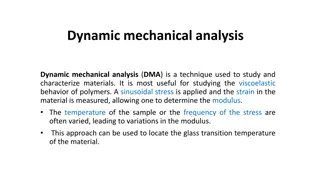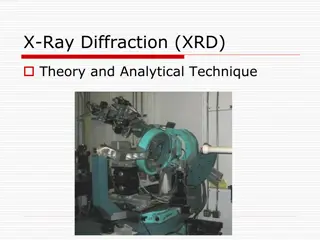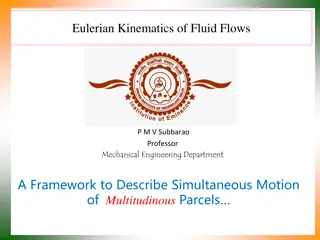Introduction to Econometric Theory for Games in Economic Analysis
This material delves into the fundamentals of econometric theory for games, focusing on estimation in static and dynamic games of incomplete information, as well as discrete static games of complete information, auction games, and algorithmic game theory. It covers basic tools, terminology, and main
3 views • 31 slides
Ginzburg Landau phenomenological Theory
The Ginzburg-Landau phenomenological theory explains superconductivity and superfluidity as distinct thermodynamic phases. It focuses on phase transitions characterized by singularities in specific heat at the transition temperature. Derived from BCS theory, it quantifies condensation energy, emphas
1 views • 38 slides
Amended Convention on Physical Protection of Nuclear Material Tabling in Parliament
The Amended Convention on Physical Protection of Nuclear Material (CPPNM) is being tabled for acceptance and ratification in Parliament on 05 September 2023. The purpose is to enhance physical protection measures for nuclear material, especially in the face of increased security concerns post the 9/
3 views • 18 slides
Crystal Field Theory in Transition Metal Complexes
Crystal Field Theory (CFT) explains the colors and magnetic properties of transition metal complexes. It focuses on the energy changes in d-orbitals of metal ions caused by surrounding ligands. This theory, developed in 1929, provides insights into the bonding interactions in complex compounds. The
10 views • 44 slides
Understanding Social Learning Theory and the Power of Example
Social Learning Theory, introduced by Bandura, emphasizes learning through observation and modeling. It explores how individuals acquire behavioral dispositions, trial-and-error experiences, and the impact of stimuli in the environment. The theory focuses on the importance of attention, retention, a
1 views • 17 slides
Evolution of Mathematical Theories and Proof Systems
Development of mathematical theories such as model theory, proof theory, set theory, recursion theory, and computational complexity is discussed, starting from historical perspectives with Dedekind and Peano to Godel's theorems, recursion theory's golden age in the 1930s, and advancements in proof t
1 views • 29 slides
Introduction to Organizational Behavior: Management Theories and Practices
Explore the evolution of organizational behavior from early management theories to contemporary practices. Understand the historical foundations and relevance of management theory in shaping workplace dynamics. Delve into key concepts like Scientific Management, Administrative Management, Bureaucrat
1 views • 28 slides
Theories on the Origin of State: Divine, Force, Patriarchal, and More
Various theories such as Divine Origin, Force Theory, Patriarchal Theory, and others explain the origin of the state. Divine theories attribute state creation to God, while Force Theory emphasizes the strong subjugating the weak to establish authority. Each theory offers unique perspectives on the h
1 views • 24 slides
Proposed Amendments for Hazardous Material Release Reporting Regulations
Amendments to the hazardous material release reporting regulations include consolidating definitions, adding new definitions, changing the administering agency, updating citations, and altering notification timeframes. The amendments aim to enhance emergency response and improve reporting procedures
1 views • 18 slides
Understanding Forgetting: Theories and Influence on Memory Recall
Forgetting is a complex phenomenon influenced by theories such as Decay Theory, Interference Theory, and Motivated Forgetting. The Ebbinghaus forgetting curve highlights how memories fade over time. Decay Theory suggests memories decay over time, while Interference Theory explains how old and new me
0 views • 25 slides
Psychological Theories of Criminality: Understanding the Roots
Psychological theories of criminality delve into the association between intelligence, personality, learning, and criminal behavior. Major theories include Psychodynamic Theory by Freud, Behavioral Theory by Bandura, and Cognitive Theory by Kohlberg. These theories explore how unconscious mental pro
1 views • 20 slides
Austin's Theory of Law by Rinkey Sharma: An Overview
Austin's Theory of Law, presented by Rinkey Sharma, delves into the Imperative Theory of Law as proposed by Austin, known as the father of English jurisprudence. It explores General and Particular Jurisprudence, Austin's definition of law, and the elements of positive law, emphasizing the concepts o
0 views • 11 slides
Criticisms on Bentham's Utilitarianism Theory
Criticisms of Jeremy Bentham's utilitarianism theory include justifying any crime for the greater pleasure, impracticability due to individual knowledge constraints, neglecting moral consciousness, oversimplifying human nature, and focusing solely on material comforts over spiritual happiness. The t
0 views • 6 slides
Theories of International Relations Overview
The field of International Relations (IR) encompasses various theories that seek to explain global phenomena, drawing from disciplines like history, philosophy, and economics. Theory, derived from contemplation and speculation, organizes ideas to explain issues such as state emergence, conflict caus
1 views • 47 slides
Understanding the Gate Control Theory of Pain in Pain Management
This detailed content delves into the Gate Control Theory of Pain, explaining pain pathways involving nociceptors, A-delta fibers, and C fibers. It further explores central pain pathways like the spinothalamic tract, spinomesencephalic tract, and spinoreticular tract. The theory's mechanism of pain
1 views • 11 slides
Understanding User Depot Module (UDM) in Material Management
Genesis UDM was developed by CRIS to computerize material management at consignees' end, integrating with iMMS and IREPS. UDM revolutionizes the supply chain of materials management through digitalization, optimizing asset maintenance, expenditure control, and promoting a shift to digital working en
0 views • 19 slides
Overview of Cooperative Game Theory and Bargaining Solutions
Cooperative game theory explores situations where players have mutual benefits in cooperating. The focus is on bargaining solutions to reach agreements despite conflicting interests. Key concepts include Nash Bargaining Solution, Kalai-Smorodinsky Bargaining Solution, and Rubinstein Bargaining Proce
1 views • 24 slides
Understanding the Theory of Firms: Neoclassical vs. Modern Approaches
The theory of firms is explored through the Neoclassical and Modern perspectives. Neoclassical theory focuses on profit maximization, while Modern theory delves into managerial, principal-agent, and transaction cost theories. The discussion covers criticisms of Neoclassical theory and the essential
1 views • 79 slides
Mechanism of General Anaesthesia Theories: Lipid Solubility, Surface Tension, Microcrystal, Protein Binding
Mechanism of general anaesthesia involves theories focusing on the interaction of anaesthetics with cell membrane components like lipids and proteins. The Lipid Solubility theory emphasizes the importance of an anaesthetic's affinity and solubility in nerve cell membranes, while the Surface Tension
1 views • 10 slides
Theories of Causation in Psychological and Social Sciences
Overview of theories of causation categorized into psychological, social psychological, and sociological perspectives. Psychological theories focus on instinctive, biological, and psychological qualities of abusers, including Attachment Theory, Psychodynamic Theory, Social Learning Theory, and Situa
0 views • 15 slides
Understanding Political Theory through a Contextual Approach
Exploring G.H. Sabine's perspective on political theory through a contextual approach, emphasizing the importance of historical context and societal influences. Sabine argues that while political theory evolves with its contemporary politics, it should be analyzed within its specific time and social
0 views • 9 slides
Understanding Material Cost Variances in Commerce
Material cost variances play a crucial role in analyzing the differences between actual and standard costs of direct materials used in production. From material cost variances to material price, usage, and mix variances, each aspect sheds light on different aspects of cost control and efficiency in
0 views • 12 slides
Evolution of Light Theory: From Wave Theory to Quantum Theory
At the turn of the century, the discovery of the photoelectric effect challenged the wave theory of light, leading to the development of the quantum theory by Max Planck and Albert Einstein. This new theory introduced the concept of discrete energy units known as quanta, bridging the gap between wav
1 views • 62 slides
Material Control in Cost Accounting
Material control in cost accounting involves maintaining a systematic control over the purchasing, storing, and utilization of materials to minimize costs while ensuring uninterrupted production. It encompasses aspects such as accounting and operational controls, aiming to balance the efficient use
0 views • 9 slides
Strategies for Developing a National Nuclear Forensics Library
Nuclear forensics involves comparing data from unknown sources with known material characteristics to determine their origin. Establishing a national nuclear forensics library is crucial for identifying nuclear materials and promoting international cooperation in investigations. Key elements include
0 views • 18 slides
Dp-branes, NS5-branes, U-duality, and M-Theory Overview
Overview of Dp-branes, NS5-branes, and U-duality derived from nonabelian (2,0) theory with Lie 3-algebra. Introduction to M-theory, including M2-branes and M5-branes in the strong coupling limit. Discussion on BLG theory, Lorentzian Lie 3-algebra, and the ABJM theory for M2-branes.
1 views • 32 slides
Exploring Material Science and Engineering Fundamentals
Delve into the world of material science and engineering to understand the core concepts, including the definition of materials, the role of material scientists, and the different types of materials such as metals, ceramics, polymers, and composites. Explore the length scales in material science, fr
0 views • 28 slides
Understanding Time-Independent Perturbation Theory in Quantum Mechanics
Perturbation theory is a powerful tool in solving complex physical and mathematical problems approximately by adjusting solutions from a related problem with known solutions. This theory allows for more accurate approximate solutions by treating the difference as a small perturbation. An example inv
0 views • 19 slides
Ethical Theories: Divine Command vs. Virtue Theory Explained
Divine Command Theory asserts that morality is derived from God's commands, contrasting with Virtue Theory which focuses on developing moral virtues to achieve human flourishing and excellence. Divine Command Theory relies on religious texts, while Virtue Theory emphasizes the cultivation of virtues
0 views • 24 slides
Understanding Fermi Liquid Theory in Interacting Fermion Systems
Fermi liquid theory, also known as Landau-Fermi liquid theory, is a theoretical model that describes the normal state of metals at low temperatures. Introduced by Landau and further developed by Abrikosov and Khalatnikov, this theory explains the similarities and differences between interacting ferm
0 views • 23 slides
Material Design: Combining Classic Design Principles with Technological Innovation
Material Design is a design language that combines traditional design principles with the possibilities offered by technology and science. It emphasizes visual language, classic design elements, and innovation to create delightful user experiences. The Material Metaphor, Imagery, Typography, Color,
0 views • 34 slides
Computational Learning Theory: An Overview
Computational Learning Theory explores inductive learning algorithms that generate hypotheses from training sets, emphasizing the uncertainty of generalization. The theory introduces probabilities to measure correctness and certainty, addressing challenges in learning hidden concepts. Through exampl
0 views • 43 slides
Automata Theory and Theory of Computation Overview
This course overview covers concepts in automata theory and theory of computation, including formal language classes, grammars, recognizers, theorems in automata theory, decidability, and intractability of computational problems. The Chomsky hierarchy, interplay between computing components, modern-
0 views • 42 slides
Theories of Interest in Microeconomics II
Explore various theories of interest in economics, including the Classical Theory, Liquidity Preference Theory by Keynes, Productivity Theory, Abstinence Theory, Time-Preference Theory, Fisher's Time Preference Theory, and the Loanable Fund Theory. These theories offer different perspectives on the
0 views • 6 slides
Exploring the Evolution of Atomic Theory
Delve into the historical journey of atomic theory starting from Democritus and Aristotle's views to modern advancements proving some aspects of Dalton's theory incorrect. Learn about key laws and theories such as the Particle Theory of Matter, Dalton's Atomic Theory, and JJ Thomson's discoveries, s
0 views • 30 slides
Applications of Density Functional Theory (DFT) in Various Fields
Density Functional Theory (DFT) is a powerful computational tool used in various scientific fields to understand complex chemical and physical phenomena. This theory allows for detailed analysis and prediction of material properties, reactions, and structures at the atomic level. Through the example
0 views • 55 slides
Exploring Dynamic Mechanical Analysis (DMA) for Material Characterization
Dynamic Mechanical Analysis (DMA) is a valuable technique for studying viscoelastic behavior in materials, particularly polymers. By applying sinusoidal stress and measuring strain, DMA helps determine modulus and locate the glass transition temperature. The method involves varying temperature or st
0 views • 8 slides
Understanding X-Ray Diffraction (XRD) Theory and Analytical Techniques
X-Ray Diffraction (XRD) is a powerful analytical technique used to study the crystal structure of materials. This method is based on the principle of X-ray diffraction by crystals, providing valuable information about the atomic arrangement within a material. By analyzing the diffraction patterns pr
0 views • 14 slides
Macromechanical Analysis of Lamina and Tsai-Hill Failure Theory Overview
The Tsai-Hill failure theory is based on the strengths of a unidirectional lamina, incorporating longitudinal and transverse tensile and compressive strengths, as well as in-plane shear strength. This theory, derived from the distortion energy theory, provides criteria for determining lamina failure
0 views • 15 slides
Understanding Material Derivative in Fluid Mechanics
Fluid flows are described using Eulerian kinematics and material derivative concepts, highlighting the changes in scalar and vector fields. The acceleration and components of material acceleration are explored, along with visualizations of material acceleration. Trajectories and displacements of flu
0 views • 13 slides












